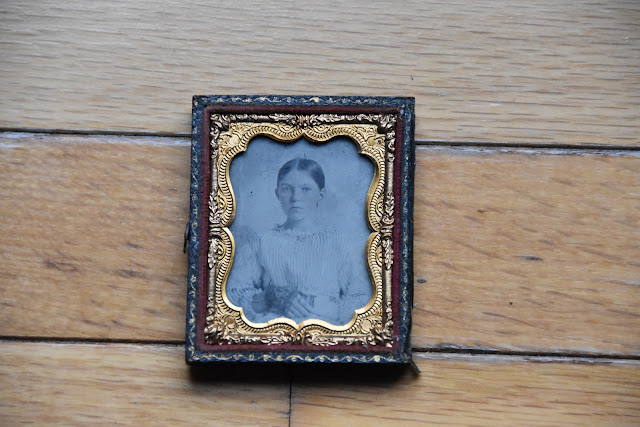I know I could have edited this photos with more care. Not today...
These are photos--part of those found by my cousin on the family home place farm--of various family member; we are in process of identifying.
The small portrait of the little girl above is that of one of my 2nd Great Grandmothers--neighbor to the 2nd G-GM on a recent post. Apparently, she always wore her hair in the same style, pulled back.
Look at the size of her hands, even as a little child; about 1850. And see that ring on her finger? I still have that ring, in the lock box, at the bank. She gave it, inscribed, to her Grandson, my Grandfather--and somehow it got down to me.
Above, she stands for a photo, perhaps around the time she was married? She was a girl in her mid-teens during the Civil War on a farm in a state which had few big battles, but lots of military activity and looting by both armies. She lost a good riding horse that way, so the story goes.
Look at her hands...though she was a "lady" she worked hard in her home. A female cousin of mine--who is a professional potter--inherited hands like that. Lucky for her. I have tiny hands, inherited from the other side of the family. They are not useful for much, I wish they were.
The gentleman shown above--one of my 2nd G-GF's--was born and grew up on the Family Home Place Farm (where we still have cousins). About 1867, he married the lady shown above. He was about 30 and she was 17. In today's world, the age difference would be troubling, but in their world it was about perfect: he was old enough, mature, able to provide for a family; she was young enough to have the long line-up of children favored in those times. His family descended from solid English gentry and even some nobility in the Middle Ages.
Get ready to weep. The little boy above was most likely their first experience with parenthood; he did not live much past his 3rd year. His little grave can be seen beside his parents' to this very day. And yes, we know his name: the next little boy born to this family group was named in his honor--my Grandfather, born 1895 to his sister who never knew him.
Had this little fellow lived, our family history would have been quite different: he likely would have grown up to inherit and work our Home Place Farm. His little sister would have probably left the farm when she married. She might not have married the man who became my Great-Grandfather, but someone else. Which means, the current family profile would be completely different.
Time after time, in Family History Play, I find situations like this: someone is born or someone dies, someone turns one way or another? Everything changes.
So, here is the child who survived--a very pretty little girl who resembled the photo of the little boy.
I can see resemblances to current family members. I'm sure her grieving parents guarded this little girl carefully.
She turned out to be an "only child"- unusual in the late 19th Century. Her parents never had another child; I have found not evidence that they lost any other children.
Look at that pretty child. She always was a lovely girl, woman, lady. She was artistic--see how she drew a smiley face on her fan in the photo above? The family still has examples of her creativity. They sent her to the Sayre School in Lexington, where she boarded in town. The present day Sayre School is more costly than many universities.
Her father passed away in 1899; her mother wore long black mourning dresses until she passed away in 1932--my own Mother had clear memories of that.






































